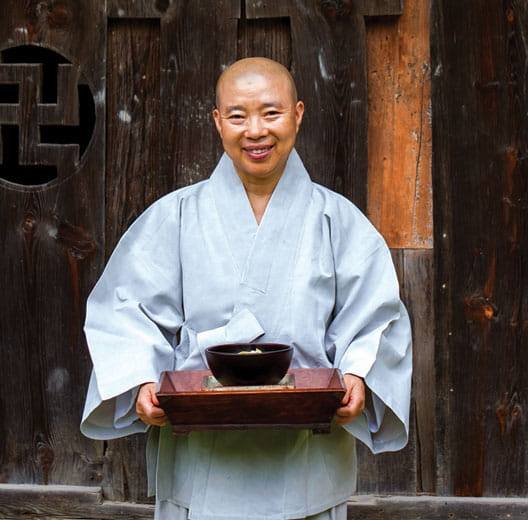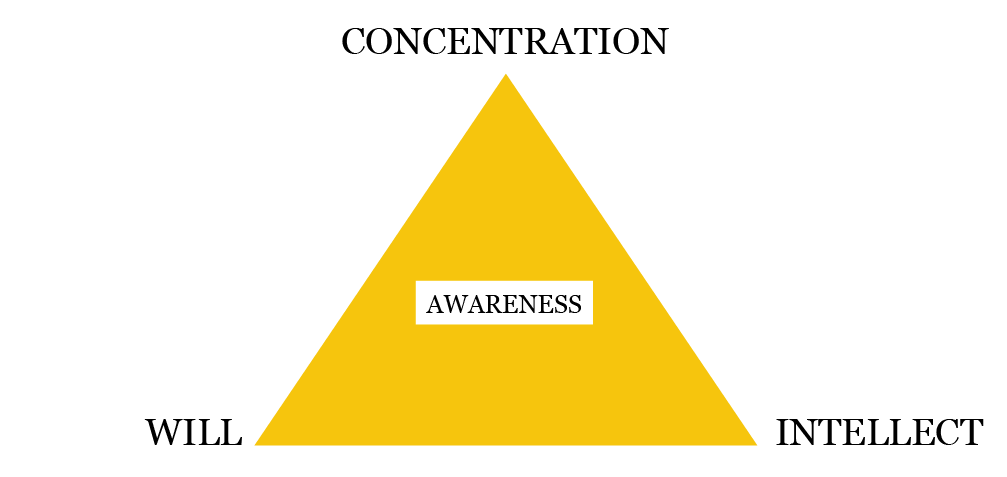One great cause of failure is lack of concentration.
Bruce Lee
Writing on concentration has been cathartic for me. It is as much balm for my past challenges with it as it is a relief as I write about the very achievable nature of concentration.
I will share my story in a bit but first I want to dive straight into the story of Jeong Kwan, a Buddhist nun or sunim who was featured on Netflix’s Chef’s Table. Her monastery is just a few hours from Seoul where she serves what she calls ‘temple food.’ This simple and yet so creative vegan food left chefs all over the world impressed so much so that French chef Éric Ripert flew her to New York to prepare a chef’s tasting menu at his Michelin starred restaurant Le Bernardin in 2015.
“I am not a chef. I am a practitioner of Buddhism,” says Jeong Kwang in an interview after the success of the show. “For me, making food is a kind of meditation (a). So being a trendy chef or an honoured chef makes me happy but moreover it makes me happy that I’m able to communicate and share with a lot of people (b).”
You’ll see that I have coloured some words above in blue and followed that with some letters in brackets. This is what I want you to bring your attention to. Chef or no chef, the tag doesn’t matter but she brings her nun-like meditative quality, or focussed awareness (a) to the act of cooking and underlying this focus is her purpose or intention (b) to share happiness and calmness through food.

Deliberate awareness and right intention – these are key to focus on short-term tasks and long-term goals while staying resolutely unfaltered even amidst n-number of distractions around you. There are multiple productivity hacks to help you with managing external distractions but that is not sustainable simply because the external is not in your control. What we need is to cultivate awareness from within that leads to deliberate concentration and flow state irrespective of external distractions.
In this post, you will learn about the 3 pillars of focused attention–
- AWARENESS & CONCENTRATION
What is concentration and how is it different from flow state
- WILL
How your ‘will’ makes it easier or harder to get into a state of concentration
- INTELLECT & INTENTION
Raise your intellect to set the right intentions

First, let’s look at the semantics.
When you are lost in thoughts, may be day dreaming, suddenly you are brought out of your stupor when in the dreamy distance you hear someone calling your name. In that moment, all of a sudden you become conscious of the fact that your awareness has floated away to somewhere far away from the present reality and the feeling of coming back is only felt when your awareness is brought back to the present moment.
Similarly, when you are reading something, and you find yourself at the end of the page, you know that you weren’t paying attention when you don’t recollect a word of what you’ve just read! This happens when your body is in the present but your awareness has floated off to another place in your mind.
Awareness is the action of focusing your attention. It is an action verb. Sustained awareness or attention on something for a sustained period of time is concentration. This is deliberate concentration, which is achieved by actively practising directing and navigating your awareness. You are completely in control of your awareness and you can do so by becoming conscious of your awareness. High levels of consciousness comes with stillness of the mind, which is achieved by focusing your awareness on your spiritual heart or your intuition. Yes, you are right. It is an interdependent cycle, which makes the art of concentration so subtle; for a scatterbrain, keeping one’s attention is understably like holding sand in one’s hand.
Make sure you are very clear on these semantics to make the most of the parts ahead! Feel free to come back to the highlighted paragraph above if at any point you need clarification on the terms.
Now that housekeeping is out of the way, we can look at the finer details of awareness and concentration.
CONCENTRATION: the precursor to flow state
Concentration is focused attention on a single point. It is when our awareness of the mind is brought to a single point for a sustained period of time. When we practise focusing our attention on something, it leads to deliberate concentration, i.e. concentration that has been acquired and sustained through active effort. But when the awareness becomes natural, i.e. the mind is simply focused without having consciousness of the fact that it is focused, it leads to a state of flow. It is kind of like day dreaming where you have lost awareness of the present moment but in the case of flow state, you are focused on productive action.
It is important to distinguish between deliberate concentration and flow state because we often expect our mind to get into a flow state of concentration without exerting any deliberate effort. That is possible but given the distractions our mind is surrounded by, it is not easy to achieve this state of frictionless concentration without initial purposeful effort. Thus, it takes practise and constant redirection of your awareness to acquire concentration.
WILL: How does your ‘will’ make it harder or easier to concentrate
While concentration, focus and awareness are properties of the mind, underlying this is the energetic property of the emotions, i.e. the ‘will’ to concentrate and commit. What this means is that if my energies are scattered or in other words, I do not have my priorities established, I will have to exert a greater force on my mind to concentrate. Think back to a time when you did not ‘feel’ like doing something but you had to finish the task. You then cajoled your mind, reprimanded it or even scared it with dire consequences, like a taskmaster does an innocent animal in a circus, to make it act a certain way. It isn’t easy. Furthermore, present the animal with toys, it is surely going to focus on the task for a few seconds before it gets distracted by the toys again. Not having your ‘will’ by your side will feel like crossing an obstacle race with an unbelievable number of obstacles on your path to completing a task. Overcoming each obstacle will require you to exert great effort to constantly bring your awareness back to the task at hand.
So, how do you ‘will’ yourself into doing a task or staying focused in spite of your ‘will’ against doing it?
Like the essence of an ocean is a water particle, the essence of your behaviours and choices is your underlying wisdom, intellect and values. The more connected you are with your inner compass, the more focused will your attention, intention and actions be. Concentration will then become a byproduct of your inner drivers.
Your wisdom helps you differentiate between what is right for you versus what is simply a desire for immediate gratification. This wisdom is your intellect. Being acutely aware of your intellect is like having a strong magnetic compass within you, always pointing you in the right direction. Without this inner compass, your ‘will’ will be scattered and you will spend every minute chasing objects and experiences driven by superficial desires, just like a bee goes after one honey laden flower after another. Contrary to a compass gone crazy and changing its pointer with every attractive prospect that comes its way, a grounded and centered compass will always keep you off the path of distractions, i.e. work with your intuition, your values and your essence to recognise what is of priority to you. Everything else will just fall off the path. When you have heightened wisdom, you will set clear goals, priorities and intentions. This will fire up the will within you to commit to a task. Having clarity of intention will drive the right attention and action. Half your battle is won.

Right, now we are getting closer to mastering our concentration but there are some more nuanced factors to consider.
We have looked at –
> what is concentration and the flow state
> how awareness plays a role in managing your concentration
> how will is the key energetic driver that can actually make it easier or harder for you to concentrate
Now, say, you have the will to complete a task or work towards a goal, but your brain is still unable to stay still enough to actually focus and apply yourself completely to the task at hand, how do you actually concentrate?
Imagine, there is a new project that you are about to start with but you find it difficult to stay focused and dive deeper into the task in spite of having the will to engage. Here, what is at play is the practise of distraction. Your mind muscle has been practising distraction for almost 16 hours a day for years and hence, has become a master at it. Thus, the state of distraction is a natural state for your mind versus the state of concentration is an uncomfortable state for your mind. Here is an extreme example. Say, you are a chain smoker and you have the will to quit smoking. You are fully aware of its ill effects and know in your deepest core that you must quit. But you cannot bring yourself to quit smoking. That is because the minute you think of a cigarette, your mind immediately triggers the gratification center in your brain. It tempts you and triggers the urge to smoke so that you can satiate the need for gratification. What you then need to do is move your awareness from the thoughts of gratification to the wisdom and the knowledge, which has willed you to quit smoking in the first place i.e., move your awareness to a higher knowing. Do this repeatedly till everytime you think of a cigarette, your first thought is the benefits of quitting and you no longer are reminded of the immediate gratification of smoking.
Now, imagine a similar scenario in your everyday tasks. You know that you must focus on a certain task but the minute your awareness goes to the thoughts of browsing social media, the awareness goes to your gratification centers of the mind. What you then need to do is bring your attention to your motivation, your inspiration and purpose. Remind yourself of why you need to get the task done.
INTELLECT: The reigns controlling your will
So, here is my story of concentration. I realised that concentration is a muscle that can be built through practise. I realised that I can ‘will’ myself into concentration with the right motivation. Finding myself in a job that I soon realised I didn’t have the right skills or experience for, but landing in a position with complex stakeholder management and billions of pounds at stake, my will and concentration were annoyingly low. I had to find the will to apply myself to the ginormous task at hand and the concentration for sustained focus to deliver good results.
Luckily, I had been practising raising my awareness and wisdom through meditation and surrounding myself with the right knowledge for over a year and that situation felt like a test, a difficult one at that. My inner compass was my parachute for survival. I had to climb a lofty mountain and the only way I could do that was by achieving stillness of the mind. And, I did! I was able to keep calm, stay focused on the goal ahead of me and stay committed to the task at hand, in spite of my will. The point is, I found something deeper than will that propelled me to take control of my awareness and direct it to set the right attention and intention, followed by the right actions. It was my inner compass or intellect that guided me.
Thus, at the crux of concentration is your awareness. Practise focusing your awareness on higher thoughts and actions. How do you know what are higher thoughts and actions? By enhancing your intellect and awareness of self. Reflect on your values and goals and set priorities accordingly. Set yourself an intention for a task as well as for goals in life. And then every time your mind gets distracted or your awareness flutters like a butterfly, bring it back to your intention. Do this again and again and again. Till it becomes second nature. I am sure you can tell that this is not an overnight process! It takes months and years of constant practise.
I was able to take control of my awareness by first recognising my inner hurdles. For me, the challenge to stay focused was not external distractions but in fact was my personal inhibitions. Recognise your inner hurdles that are keeping you from acquiring higher states of concentration. The external hurdles are obvious like social media. And there are multiple productivity hacks for it. But, till you do not tackle your inner resistance and ignorance, it will feel like a constant uphill trek.
Use your intellect to intimately recognise your inner resistance, your values, your core drivers and motivations. The intellect will tell you what to bring your awareness to. You can raise your intellect by focusing the awareness on your ‘self’, the true inner self. Recognise and understand your inner compass.
Meditation is key to raising awareness.
By meditation, yes, I am referring to the traditional practice of sitting in a place and bringing your focus on your breath or just the cloud-like thoughts floating across your mind. But that is just one aspect, you will be able to ease into deliberate concentration in your everyday tasks by practising awareness in the now,i.e. Extend your meditation practise to every part of the day just like nun Jeong Kwan did. During seated meditation, you will practise directing your awareness for a few minutes in the day, But by taking the reigns of your awareness in every moment of the day, you will soon be able to be fully present in the now.
CONCLUSION
In Summary –
> Build your intellect to know what to focus on
> Build your intellect by introspecting on and committing to your values and your inner compass
> Make meditation, or awareness a constant practise throughout the day
> Strengthened and controlled awareness is deliberate concentration
> Deliberate concentration with practise makes it easier to get in the flow state of mind

Finally, all introspective journeys take time. A simple hack to see immediate changes in your concentration levels is to set your intention before every single task. Start with setting intentions right from the time you wake up. Let the intentions be in line with your intellect, which has helped you define your short-term tasks and long-term goals. This will create the right will, which will make it easier to get into a state of concentration. Intention should be followed by deliberate attention or awareness of the task at hand, which will in turn lead to right actions, and desired outcomes.
*
I write about living from your true self in my blog called Source-Driven. Do give it a read and subscribe for a weekly dose of spiritual pick-me-up.


